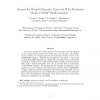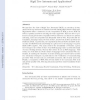10 search results - page 2 / 2 » Deciding Security for Protocols with Recursive Tests |
CCS
2011
ACM
12 years 5 months ago
2011
ACM
We consider security properties of cryptographic protocols that can be modeled using the notion of trace equivalence. The notion of equivalence is crucial when specifying privacy-...
JCS
2008
13 years 5 months ago
2008
The secrecy problem for security protocols is the problem to decide whether or not a given security protocol has leaky runs. In this paper, the (initial) secrecy problem for bound...
FC
2005
Springer
13 years 11 months ago
2005
Springer
Two parties, say Alice and Bob, possess two sets of elements that belong to a universe of possible values and wish to test whether these sets are disjoint or not. In this paper we ...
COCO
2010
Springer
13 years 6 months ago
2010
Springer
We investigate the question of what languages can be decided efficiently with the help of a recursive collisionfinding oracle. Such an oracle can be used to break collisionresistan...
IANDC
2011
13 years 12 days ago
2011
We introduce the class of Rigid Tree Automata (RTA), an extension of standard bottom-up automata on ranked trees with distinguished states called rigid. Rigid states define a res...


